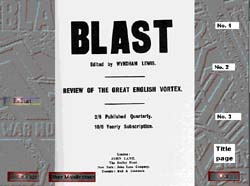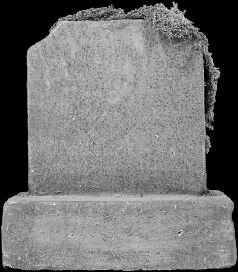1. Names
Mark Scroggins has named names: the luminaries of contingent poetry include: Ammiel Alcalay, Geoffrey Hill, Geraldine Monk, Peter Riley, John Peck, Allen Fischer, Robert Sheppard, Susan Howe, and John Matthias, along with early Ronald Johnson, and forerunners Charles Olson and (at times) Robert Duncan. Steve Burt has dropped in another suggestion from the forerunners zone: Basil Bunting. So anyone who wants to put together an anthology of contingent poetry is halfway there already!
Let me name another name here, not a contingent poet, but a guy who's condensed some of my cloudly observations into a 100-proof shot of contingent poetics: Henry Gould. Henry tells us that contingent poetry involves "the idea of poetry being infiltrated by, or overlapping with, the "speech-acts" of history, which never really disappear." Nice, and so much clearer than what I'm going to try to say in the "Adverbial Contingency" part of this post!
2. Discarded Dichotomy
I was mulling over the idea of writing an entry in which I riffed on an old distinction of Donald Davie's, from Ezra Pound: The Poet as Sculptor, between the poet as stone-carver and the poet as caster-of-plaster (Davie seems to be in the air lately: he's cropped up on Mark's blog too). I thought I'd say something about how the contingent poet works with existing documents and with language in the context of its history. Maybe, I thought, I could claim that this was like the poet as stone-carver, who worked against (or with) the resistance provided by his documentary materials. In contrast, we could see a lot of contemporary indeterminate poetry as a matter of plaster-pouring: that is, of using language without a sense of the resistance of actual historical text. But I was bothered by two things. Firstly, the simplicity of such a dichotomy meant that it would create about as much confusion as it would clarity. Secondly, the Poundian connotations it would create for contingent poetry struck me as a bit off (Pound was Davie's master stone-carver). I couldn't quite put my finger on the nature of my problem with Pound as a model for contingent poetry, though — until an email from John Peck dropped into my in-box. Peck (as always) had something important to say, and a condensed way of saying it. In this case, it involved a distinction between Pound and Olson that could, I think, go a long way toward isolating what is important about contingent poetry. Pound, said Peck, was a poet of the verb, and Olson a poet of the adverb. Let me (by quoting and glossing) explain:
3. Adverbial Contingency

 Peck set up his Pound/Olson distinction by picking up on my comment about synchronicity being an important part of contingent poetry (Peck knows about this stuff, having studied for a dozen years at the Jung Institute in Zurich, so I bow to his superior knowledge here). He says:
Peck set up his Pound/Olson distinction by picking up on my comment about synchronicity being an important part of contingent poetry (Peck knows about this stuff, having studied for a dozen years at the Jung Institute in Zurich, so I bow to his superior knowledge here). He says:
Synchronicity is best backed not by the OED but by the joint work of Jung and Pauli in their combined papers on the theme, in the 1950s. The meaning referred to in that OED summary is the result of acausal orderedness, as Jung's translator has it. And that perspective, which submits all of our rationality, discernment, and God-Almightiness to a different grid of meaning than the kinds which submit to the analysis of intention, will, or any of the Aristoelian modes of causaltity, has a number of consequences which only a patient engagement with...materials can work out.
So what, you ask, could this have to do with Pound and Olson? Find out in this next installment:
One corollary of [this] for our own explorations, perhaps, would be the dialogue between Pound and Olson. If Olson can be trusted as a witness here, he was more sensitive to this synchronistic dimension, or intution, than was Pound, his great catalyst in what you are naming as contingent poetics. Pound's hash has never been settled on these scores--is he to be taken as an egoistic fascist, or as a Taoist submitter to the contingent "process" of the several Eastern metaphysical tradtitions? or both? But his hash need note be settled now for us to register Olson's protest against Ezra, namely that Pound was driven by his passions to drive "the beak of the ego" through his (contingent, textual, linguistic-record) materials.
This strikes me as dead-on. While Pound was very much a worker of documents and historical text, he was also very much a poet who would consciously, deliberately bend these materials into illustrations of his utopian dreams. Hence the didactic quality that (to my mind) sometimes mars the work. Hence the accuracy behind Gertrude Stein's famously catty quip that Pound was "like a village explainer, excellent if you are a village, but if you are not, not." (Pound's quip against Stein — that she was an "old tub of guts" was just as mean spirited, but not nearly as witty). Peck goes on, saying:
It occurs to me that Pound's way and Olson's way diverge along lines which philology can illuminate in its good old-fashioned manner.... Pound's egoism, in Olson's view, would correspond to Pound's dogged application of Fenollosa on the Chinese written character as a model for his poetics: to paraphrase that application, reality is not a noun but a verb. Pound's suspended lobes of syntax, which come almost to dominate the later Cantos, typically depend from a relative pronoun — "that" — which can refer either to an unexpressed verb preceding, or to the verb explicit in the suspended phrase itself; or electrically to both the implicit and exlicit verbs in the suspension. Those cantilevered lobes typically express a wish that a certain action be possible, or a certain alignment of civic forces, or configurations of justice, be enacted (when in fact they remain frustrated). These little phrases may seem wistful and fragmentary, but they entail whole genres: utopias simply, and thoroughly, elaborate what such compact suspensions compactly project as syntax.
Right. Bear with Peck on this, because it gets good. So: Pound gets his utopianism into the very syntax of the poetry. I admit to having been a bit bleary about this for a moment, but a quick consulatation with my colleague down the hall, Ben Goluboff cemented the notion in my mind. What we're dealing with here is the optative mood of wishing, combined with a kind of syntactic ambiguity that allows for the pronoun "that" to depend from both an explicit and an implicit verb. My copy of The Cantos is elsewhere, and Ben, having just moved to the enviably commodious corner office of a retired colleague, regrets to say that his is in a box somewhere, but here's an example he concocted (not Poundian poetry, but it illustrates the point: "I wish that the cavalry had come sooner, God still in his Heaven and all right with the world." We've got the explicit wish, as well as an implicit one, in which we assume that the word "that" and the verb "to be" applied to the bit about God ("that God were still in his Heaven...") and so forth. Peck's right about this as a mannerism of the later Pound, I'm sure. (A valuable prize to anyone who sends me a really good example from the late Cantos).
But here's the important bit: what we get with this structure is a sentence haunted by an implicit verb, and in a way Pound's poetry gives us the sense of a world haunted by Pound's own utopian wishes in the form of implicit "would that it were so's." His poetry depicts reality as something that he wishes (even wills) he could make into his ego's desire. He works with document and historical materials, but he wants to bend them to his utopian (and, in many views including mine, dystopian) will.
But how is Olson different? "It seems to me," says Peck:
...that Olson's own suspended lobes of syntax, his self-interruptions, his open parentheses, together correspond to his fascination with those syntactic and relational capacities which English suppresses — thus his commentaries on the Middle Voice for verbs in Greek, for example. And that these structures in Olson's work, prose and verse alike, predispose him to turn away from the reality-as-verb view, and rather toward one in which reality is an adverb: not the substantialist quidditas of nouns, nor the dynamic (and egoic?) energics of verbs, but rather the relational and qualifying process foci of how, when, and where. In your phrase, the contingencies of X rather than their indeterminacies.
So in Olson we don't get the world as ego-guided verb (the world as "would that it were as I willed it") but the world as adverbial. I take Peck to mean something like this: that Olson doesn't project a direction on to his material, that he doesn't try to make something happen, but that his goal is simpler: to understand and describe the specific nature of our experience. The poem won't supply the yearned-for direction of history (verb); it will describe the quality or nature of a dynamic history (adverb). It won't answer questions about what history means or why it is as it is: rather, it will say something about how it is as it is. Here's Peck on this, describing how the Olsonian project feels to him: "What? I dunno, and why? who knows, but how, perhaps, can instruct me, if only I will really look and inquire among the materials of what has been rising/happening/taking place." And this is contingent, in that it is a matter of the specific, proper-noun world of history.
Just as I was mopping the sweat off my brow (something that happens every time I read one of Peck's 400-pound-per-square-inch emails) another email from him popped up on my screen, with this bit, which helped to cement the Pound-Olson distinction for me:
The adverbial function of Olson's poetics ... legitimizes the ego's position by atomizing and reconsituting the ego that Olson saw at work in the cussedly independent Pound. It takes the "bird's beak" and reassembles it in an Escher-like cotillion of Getstalten that fold through each other as they get thrown into upheaval by a stiff whiff of change.
Rather than forming history to the ego's desire, as Pound did, Olson sees the ego as constituted by complex fields of history.
All of this reminds me of what Kristin Prevalet said about Ammiel Alcalay, as well as some of the things Michael Anania had to say about John Matthias' poetry in "Talking John Matthias," from issue nine of Samizdat, which I suppose I should have added (along with the other missing issues) to Samizdat's website. So: if this sense of a self interpollated into history is common to Olson, Alcalay and Matthias (and distinguishes them from Poundian egoism) I think we're on the way to understanding some of the core elements of contingent poetry.
 This does not seem, at first glance, to bode well. It has the look of that post-Robert Lowell, personal stuff, without the grand agonies that gave Lowell power, and without the sense of liberation from musty, New-Critical, highly-wrought poetry that Lowell gave us so long ago. I mean, at least Lowell could write "my mind's not right," while Goldbarth seems to have moved from problems of the mind to problems of the prostate — dramatic problems, if you have them, but less sublime than Lowell's madness. But — and here's the good stuff — the poem doesn't stick to these very local, personal problems, at least not directly. It takes an odd and interesting turn, and places the treatment of these individual problems in the context of (wait for it) the American Revolution. You get the oddest sort of parallels between modern urology and Revolutionary history and, surpisingly, it works. There's something of the metaphysical poets' famous yoking together of the apparently unlike here, a kind of virtuoso quality that you fear you're not going to get when you read those opening lines.
This does not seem, at first glance, to bode well. It has the look of that post-Robert Lowell, personal stuff, without the grand agonies that gave Lowell power, and without the sense of liberation from musty, New-Critical, highly-wrought poetry that Lowell gave us so long ago. I mean, at least Lowell could write "my mind's not right," while Goldbarth seems to have moved from problems of the mind to problems of the prostate — dramatic problems, if you have them, but less sublime than Lowell's madness. But — and here's the good stuff — the poem doesn't stick to these very local, personal problems, at least not directly. It takes an odd and interesting turn, and places the treatment of these individual problems in the context of (wait for it) the American Revolution. You get the oddest sort of parallels between modern urology and Revolutionary history and, surpisingly, it works. There's something of the metaphysical poets' famous yoking together of the apparently unlike here, a kind of virtuoso quality that you fear you're not going to get when you read those opening lines.














